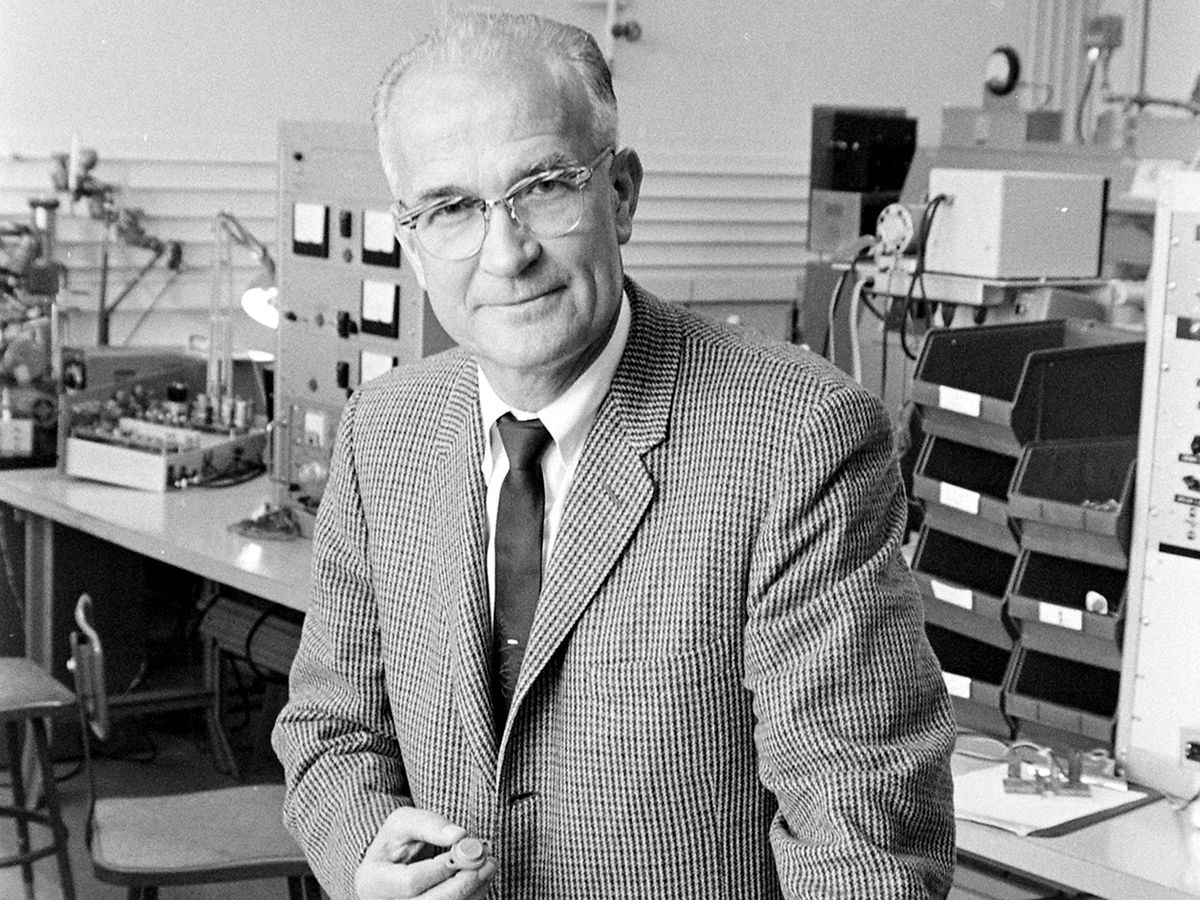William Shockley: Transistor Pioneer & Controversial Figure - Uncovered
Could a single invention truly reshape the modern world? The transistor, a device smaller than a thumbnail, achieved precisely that, and William Bradford Shockley was at the forefront of its creation. His story is a complex tapestry woven with threads of brilliance, controversy, and lasting technological impact.
Born in London on February 13, 1910, Shockley's journey took him from the hallowed halls of academia to the heart of Silicon Valley, a region he, in part, helped to birth. He was a man of profound intellect, a Nobel laureate, and a pioneer. However, his legacy is also shadowed by his controversial views on race and intelligence, views that have forever linked his name to a heated debate.
Shockley's early academic pursuits led him to the California Institute of Technology and the Massachusetts Institute of Technology. This foundation prepared him for a career that would revolutionize electronics. Before the advent of the transistor, electronic devices relied on bulky, power-hungry vacuum tubes. These limitations hampered the development of smaller, more efficient devices. Shockley, along with John Bardeen and Walter Brattain, at Bell Labs, embarked on the quest to find a solid-state alternative. Their combined efforts culminated in the invention of the transistor, a tiny component that could amplify or switch electronic signals.
| Attribute | Details |
|---|---|
| Full Name | William Bradford Shockley |
| Born | February 13, 1910, London, United Kingdom |
| Died | August 12, 1989, Palo Alto, California, USA |
| Nationality | American |
| Education | California Institute of Technology, Massachusetts Institute of Technology |
| Fields | Physics, Inventor |
| Known For | Co-inventor of the transistor, Nobel Prize in Physics (1956) |
| Institutions | Bell Labs, Stanford University |
| Awards | Nobel Prize in Physics (1956) |
| Key Contributions | Development of the transistor, research in semiconductors, theories on the genetic basis of intelligence (controversial) |
| Controversies | Eugenics, views on race and intelligence |
| Reference | Nobel Prize Website - William Shockley |
The impact of the transistor was immediate and far-reaching. It paved the way for smaller, more reliable, and more efficient electronic devices. This single invention sparked a technological revolution, leading to the development of integrated circuits, microprocessors, and all the technologies that define the modern world. Without the transistor, there would be no smartphones, computers, or the vast digital landscape we inhabit today.
The Nobel Prize in Physics in 1956 was awarded jointly to Shockley, Bardeen, and Brattain for their pioneering work on semiconductors and the discovery of the transistor effect. This recognition solidified their place in history as architects of the modern electronic age. The award was a testament to the profound significance of their achievement, forever linking their names to one of the most transformative inventions of the 20th century.
However, Shockley's story takes a darker turn. While his scientific contributions were undeniable, his views on race and intelligence cast a long shadow over his legacy. Shockley became an ardent proponent of eugenics, advocating for the idea that genetic factors play a dominant role in determining intelligence and that racial groups differed in their inherent intellectual abilities. He believed that certain racial groups, particularly Black people, were inherently less intelligent due to genetic inferiority.
- Camilla Araujo Leaked Videos See Whats Trending Now
- Camilla Araujo Leaks Nsfw Content What You Need To Know
These views were deeply controversial and widely condemned by the scientific community. They were based on flawed data, biased interpretations, and a fundamental misunderstanding of the complexities of human intelligence and genetic variation. Shockley's theories fueled racial prejudice and discrimination, and his association with these views caused him to become an academic pariah.
Shockley's controversial beliefs extended beyond academic circles. He actively promoted his theories in public, giving lectures and publishing articles that advanced his eugenicist ideas. This further alienated him from many of his peers and the broader scientific community. His outspokenness on these issues often overshadowed his scientific achievements and tarnished his reputation.
His involvement in the genetics of intelligence, a controversial topic even today, was not limited to theoretical discussions. Shockley sought to find empirical support for his ideas. He administered IQ tests and other assessments, interpreting the results to bolster his predetermined conclusions. This approach was criticized for its methodological flaws and its potential for perpetuating harmful stereotypes.
The consequences of Shockley's views extended beyond the academic realm. They had real-world implications, contributing to a climate of racial tension and discrimination. His ideas were used to justify discriminatory practices, such as unequal access to education, employment, and opportunities. The legacy of his eugenicist beliefs serves as a stark reminder of the dangers of scientific prejudice and the importance of critical thinking.
In 1947, the world changed with the invention of the transistor, and Shockley played a pivotal role in that. His work at Bell Labs, alongside John Bardeen and Walter Brattain, resulted in a breakthrough that would reshape technology forever. The transistor's impact was immediate, leading to miniaturization, increased efficiency, and the dawn of the information age. This discovery earned them the Nobel Prize in Physics in 1956, a recognition of their monumental contribution.
After his contributions to the development of the transistor, Shockley moved to Stanford University. Here, he took on a professorship and helped to establish an environment that would later foster Silicon Valley. Even though he was a prominent figure in academia, his theories on eugenics and race became increasingly prominent, drawing a wedge between him and the scientific community. His controversial views made him a complex figure whose influence had both positive and negative effects.
Shockley's legacy is a paradox. On one hand, he was a brilliant physicist and inventor whose work fundamentally altered the course of human history. The transistor, a device he helped create, is the cornerstone of modern technology. On the other hand, his embrace of eugenics and his controversial views on race and intelligence have irrevocably stained his reputation. These views, rooted in pseudoscience and prejudice, stand in stark contrast to the principles of equality and scientific integrity.
His belief in the genetic basis of intelligence, which he applied to justify claims of racial differences, contradicted the scientific consensus and created an environment of controversy. This side of his legacy reveals the complexity of human nature, showing how even individuals of great brilliance can be prone to flawed thinking and harmful prejudices.
The establishment of Stanford University and the rise of Silicon Valley were, in part, influenced by Shockley. The environment of innovation and the intellectual exchanges at Stanford helped shape the technology that would later impact the world. His presence, even with its controversies, was a part of this formative period.
The story of William Shockley serves as a crucial lesson. It demonstrates that the pursuit of scientific progress should not come at the cost of ethical principles and social justice. It is a reminder that even the most brilliant minds can be flawed and that we must be vigilant in challenging ideas that promote discrimination and inequality. His life highlights the importance of critical thinking, intellectual honesty, and the continuous pursuit of a more equitable and just world.
Shockley's story invites a profound examination of the relationship between science, society, and ethics. While his contributions to physics and electronics are undeniable, it is essential to confront and understand the harm caused by his controversial views. This requires recognizing the multifaceted nature of history, including both triumphs and failures, to fully appreciate its complexity and the lessons that it holds.
The controversies surrounding Shockley have not diminished the importance of his contributions to physics. Instead, they have made his legacy even more complex. His life serves as a case study of how scientific achievements can be overshadowed by personal beliefs that challenge the very fabric of equality.
The enduring impact of the transistor continues to shape the world. The technology that emerged from his work with Bardeen and Brattain has transformed communication, information processing, and numerous other fields. This lasting impact highlights the profound effect of his pioneering work.
Shockley's views on race and intelligence are a significant aspect of his legacy, and a constant reminder of the importance of intellectual humility and the dangers of letting personal biases interfere with the pursuit of knowledge. These ideas led to a public debate and a reassessment of scientific responsibilities. The debate that followed his controversial viewpoints highlighted the need for scientific integrity and the detrimental effects of prejudice.
His contribution to the founding of Silicon Valley and Stanford University cannot be overstated. Silicon Valley, with its emphasis on innovation and technology, was in part shaped by the environment that Shockley helped establish. His work has left an indelible mark on these institutions and on the wider world.
Therefore, the complete picture of William Bradford Shockley is nuanced. He was a brilliant scientist and inventor, but he was also a controversial figure whose beliefs created a lasting impact. His life is a testament to the complexities of progress, the power of innovation, and the enduring importance of confronting social biases. Exploring both his accomplishments and his failures offers insights into the ongoing development of technology, the responsibilities of scientists, and the need for a society founded on respect and equality.



Detail Author:
- Name : Oswaldo Christiansen
- Username : wilma08
- Email : elta34@hotmail.com
- Birthdate : 1986-11-27
- Address : 632 VonRueden Haven Suite 966 South Eldridge, IN 86628
- Phone : +1 (720) 527-0671
- Company : Satterfield-Kuhlman
- Job : Sawing Machine Operator
- Bio : Id perferendis nemo necessitatibus incidunt earum. Exercitationem at voluptatibus atque quia delectus nostrum. Excepturi repellendus et illo.
Socials
facebook:
- url : https://facebook.com/kochg
- username : kochg
- bio : Et voluptas temporibus beatae fugit voluptatem.
- followers : 3219
- following : 2360
twitter:
- url : https://twitter.com/gwen966
- username : gwen966
- bio : Qui ratione dolorem non explicabo sed unde. Excepturi praesentium eos reprehenderit itaque omnis. Eaque adipisci voluptas rerum quo nam facere aut.
- followers : 3844
- following : 353
instagram:
- url : https://instagram.com/koch2010
- username : koch2010
- bio : Animi eius suscipit consequuntur. Minima voluptatibus in ullam dolore occaecati enim earum.
- followers : 3041
- following : 2510
tiktok:
- url : https://tiktok.com/@gwen_koch
- username : gwen_koch
- bio : Possimus ratione repellat consequatur quod. Deserunt hic nihil perspiciatis.
- followers : 1066
- following : 13